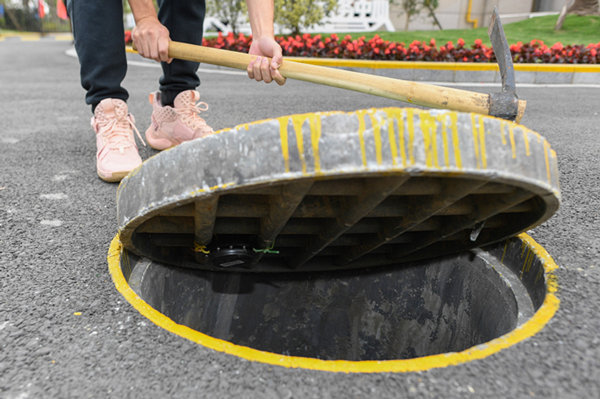
A community worker shows a smart manhole lid in Hangzhou, Zhejiang province, on Oct 23, 2019. (Photo: Xinhua)
It may sound like making a mountain out of a molehill when the Supreme People's Court, the Supreme People's Procuratorate and the Ministry of Public Security work together on a document about manhole covers.
But with more than 70 incidents of coverless manholes, or manhole covers of inferior quality, being responsible for injuries, even deaths, from 2017 to 2019, their issuing of the 12-article Guiding Opinions on Handling Criminal Cases Related to Manhole Covers is a welcome step toward addressing an outstanding safety concern in urban China. One that deserves to be reworked to cover a wide range of similar safety issues.
"Manhole covers are often ignored, but they very much relate to people's lives, personal safety and property security," Wan Chun, an official from the Supreme People's Procuratorate, said on Wednesday, while introducing the guidelines.
In a historical precedent, the guiding opinions not only go into the technicalities of such cases, but they also have considerably upgraded corresponding liabilities, making many of them criminal and widening their coverage.
Offenses subject to criminal punishments range from the theft and destruction of manhole covers to dereliction of duties on the part of management authorities and their staff.
Based on locations and circumstances, those stealing or destroying manhole covers may be convicted for the crime of sabotaging traffic facilities, the crime of endangering public safety by dangerous means, the crime of intentionally inflicting injuries, the crime of intentionally committing homicide, the crime of stealing, or the crime of intentionally destroying or damaging money or property.
Manufacturers of shoddy and inferior manhole covers, along with public officials who fail in their duties regarding the procurement, inspection and maintenance of manhole covers, may also be investigated for criminal liabilities.
Such unprecedented harshness is no doubt conducive to preventing the repeat of past tragedies, especially when many southern regions enter the rainy season, as the potential danger of coverless manholes becomes more lethal then.
With criminal liabilities stipulated in such explicitness, certainly all those involved will be more vigilant, and the situation may see swift improvement.
While the document plugs a gaping loophole, there is no exaggeration in saying equally conspicuous blanks exist in other safety guarantee mechanisms awaiting to be addressed. The safety of tactile paving for the blind and visually impaired, for one, calls for equal emphasis.
After introducing the manhole cover rules, law enforcement authorities should consider broadening the coverage and applicability of such stipulations, so as to provide broader support for public safety.


